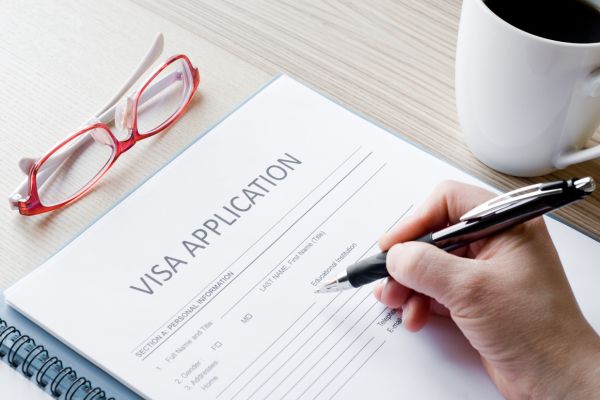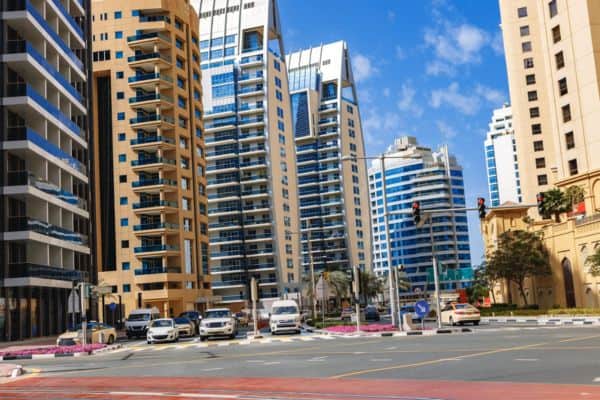The Essential Guide to Moving to Dubai for Work

by Hayley
Are you planning to move from the UK to Dubai for work? This essential guide is here to help you navigate every aspect of your relocation, from securing the necessary visas to understanding the job market and adapting to the local culture. With the right preparation, you can ensure a smooth and successful transition to your new life in one of the world’s most dynamic cities.
Navigating the UAE’s visa requirements is a crucial first step, as obtaining a valid work visa and necessary documentation, such as a medical fitness certificate, is mandatory for expatriates. Dubai’s job market is robust, particularly in high-demand sectors like finance and technology, but it’s also highly competitive. This guide will offer insights into effective networking strategies and tips on tailoring your job applications to stand out in the crowded market.
Beyond employment, understanding the cost of living in Dubai, including housing, transportation, and healthcare, is essential for effective financial planning.
Whether you’re drawn to the luxury lifestyle or seeking a family-friendly environment, our guide will help you make informed decisions, ensuring that your international relocation to Dubai is as seamless and rewarding as possible.
1. Understanding Visa Requirements
Navigating the visa requirements for moving to Dubai is the first step. Expatriates must comply with UAE immigration laws, which involve obtaining a valid visa for long-term residency.
Your passport must be valid for at least six months when relocating. A health check may also be required to ensure no communicable diseases are present.
Upon arrival, your employer has 60 days to arrange a residence visa.
Work Visa Types
Dubai offers various visa types, primarily linked to employment, investment, or family sponsorship. For expatriate workers, a residence permit is usually valid for either one or two years, ensuring legal stay and work authorisation.
Knowing the different visa types helps you align your relocation plans accordingly.
Application Process
The work visa application involves several steps. Your employer can sponsor the visa and manage the paperwork. A valid job offer that complies with the Ministry of Human Resources and Emiratisation’s regulations is indispensable.
After arriving in Dubai, your employer has 60 days to finalise your residence visa. A medical fitness certificate is also mandatory.
Required Documentation
Submitting the correct documentation is crucial for obtaining a work visa. Essential documents include a valid passport, job offer letter, and health certificates proving fitness for work.
Proper preparation and submission of all documents will facilitate a smoother visa application process.
2. Navigating the Job Market
Dubai’s job market is expanding rapidly, offering numerous opportunities for skilled workers who want to move to Dubai.
Characterised by a strong emphasis on innovation and technological advancement, it attracts professionals from around the globe.
However, it’s highly competitive, requiring strong networking and tailored CVs for success.
High-Demand Sectors
Knowledge of high-demand sectors can significantly enhance your job search. Key sectors include finance, technology, construction, hospitality, and retail, all vital to Dubai’s economy.
These sectors drive the city’s growth and offer diverse opportunities for expatriates.
Job Search Tips
Personalising your CV and cover letter for specific job applications increases your chances of getting hired. Networking is crucial, with many opportunities arising from personal connections. Recruiters frequently use LinkedIn to find candidates, so keep your profile updated.
Participating in community activities, such as volunteering or attending cultural events, can help newcomers integrate into Dubai’s society. Joining local clubs or community groups also facilitates friendships and social integration, enhancing job prospects and building a social network.
Salary Expectations
Salary expectations in Dubai can vary widely based on industry and demand. For instance, data scientists earn an average monthly salary of AED 25,000 (£5,181), reflecting the high demand in that field. Professionals in the healthcare sector are among the highest earners, with wages often higher than in the UK. This is a major benefit for those considering relocating to Dubai.
Knowing these variations helps set realistic expectations and aids in financial planning.
3. Cost of Living in Dubai
The cost of living in Dubai from the UK is relatively more affordable than in the UK, thanks to a lower cost of living index.
Salaries and benefits are typically better, enhancing purchasing power.
However, it’s essential to budget for various expenses, including housing, transportation, and daily living costs.
Housing Costs
Accommodation is a major cost associated with moving to Dubai. Housing options range from sprawling villas to high-rise apartments. Popular options for expats are ready-to-move properties, either built or near completion.
The average rent for a one-bedroom apartment in the city centre is around AED 5,141 (£1,065), while a three-bedroom apartment costs approximately AED 9,766 (£2,024).
Transportation Expenses
Dubai’s public transportation system includes the metro, buses, and taxis. A monthly ticket costs around AED 312 (£64), making it a cost-effective option for daily commutes. Fuel prices are low, with petrol costing about AED 2.76 (57p) per litre.
Understanding these costs helps you plan your daily transportation budget.
Daily Living Expenses
Daily living expenses in Dubai include essential costs like groceries, dining out, and entertainment. Groceries are a significant part of living expenses, with basic food items like milk costing around AED 7 (£1.45) per litre.
Creating a budget for these expenses ensures better financial management.
4. Healthcare System in Dubai
Dubai’s healthcare system includes a mix of public and private hospitals and clinics delivering high-quality medical services to residents and expats. Securing adequate health insurance is crucial for expatriates moving to Dubai.
Health Insurance
Health insurance is essential for covering medical treatment costs. Many expats opt for private health insurance to ensure quick access to quality care. Employers in Dubai must provide private health insurance for their expat employees, though coverage for dependents is not compulsory.
The Essentials Benefits Plan (EBP) offers affordable medical coverage, including options for children and domestic staff.
Public vs. Private Healthcare
Private healthcare facilities are preferred by most expats due to shorter wait times and a broader range of specialists. Emergency treatments at government hospitals are typically free of charge, but public facilities may have longer waiting times compared to a private hospital.
Expats can use a co-payment system for medical services, with a maximum annual cap on co-payments set at 1,000 dirhams.
Accessing Medical Services
To access medical services, expatriates must present their health insurance card and identification. Public healthcare facilities are generally more affordable but might have longer waiting times, while private hospitals offer personalised services and shorter wait times.
Ensuring you have the necessary documentation and understanding how to navigate the healthcare system is essential for maintaining health in Dubai.
5. Cultural Adaptation
Adapting to the local culture is crucial for successfully transitioning to life in Dubai. Understanding the local culture, including history and customs, is essential for integrating into the community.
Local Customs and Etiquette
Respecting local customs and etiquette is vital. For example, using the right hand for eating and greeting is a common practice, while public displays of affection are strictly prohibited and may lead to legal consequences. Understanding these customs helps avoid potential cultural faux pas and fosters better community relations.
Language Barriers
Arabic is the official language of the united arab emirates. However, English is commonly spoken in Dubai. While many expatriates may not need to learn Arabic for daily interactions, understanding basic Arabic greetings can enhance social interactions and show respect for the local culture.
Social Integration
Getting involved in community activities, such as local charities and events, can help expats feel connected and establish their place in Dubai. Participating in cultural festivals and exhibitions not only enhances understanding of the local culture but also creates opportunities to meet diverse people.
Networking events provide a perfect opportunity to meet other professionals and expand your social circle.
6. Legal Considerations
Legal considerations are crucial for expatriates in Dubai. Everyone living in the UAE must have an Emirates ID card, which serves as a primary identification document.
Non-UAE nationals do not receive social welfare benefits from the UAE government. This policy reflects the country’s approach to social support.
Residency Laws
To apply for a personal and corporate bank account in Dubai, a UAE residency visa is required. Expats typically need a residence visa and employment verification to open a bank account.
Understanding these residency laws ensures compliance with local laws.
Employment Contracts
Employment contracts in Dubai must include job responsibilities, salary, benefits, and the duration of the contract. These contracts must be signed by both parties and registered with the Ministry of Human Resources and Emiratisation.
Termination clauses specify the conditions under which either party can end the agreement.
Legal Rights and Obligations
Expat workers must understand their rights and obligations under UAE labour laws. They are entitled to end-of-service benefits after completing a certain period of employment.
After fulfilling their employment duration, they are eligible for benefits that support their transition upon leaving the job.
7. Education Options for Families
Education is a vital aspect for expatriate families relocating to Dubai. Numerous educational institutions cater to various curricula, primarily through international schools designed for expat families.
International Schools
Many international schools in Dubai follow different curricula, including British, American, and IB systems. The quality of education in these schools is high, adhering to rigorous standards, especially those following the British education system. Students can attain qualifications such as IGCSE and A-Level.
School Fees
School fees in Dubai vary significantly based on the institution and curriculum. Education in Dubai is not free for non-citizens, so families should budget for tuition fees.
Investing in education in Dubai is worthwhile due to the high quality of education and facilities available.
Admission Process
Most international schools in Dubai require a non-refundable application fee. Knowing the admission process and preparing the necessary documentation can simplify enrolling your children in school.
8. Financial Planning
Effective financial planning is crucial for a smooth transition to life in Dubai. The absence of income tax on salaries is a significant financial benefit for expatriates.
However, additional costs such as accommodation, healthcare, and schooling should be considered when budgeting.
Banking in Dubai
Dubai has a diverse banking system, with various types of banks including commercial, investment, and Islamic banks. Mobile banking is popular, allowing expats to manage accounts and transfer money using smartphones.
To open a bank account, expats typically need to present identification documents, proof of employment, and a residence visa. Understanding local banking fees, payment systems, and currency exchange rates is essential for managing finances.
Tax Benefits
One of the major financial benefits of working in Dubai is the absence of income tax on salaries and wages. This contributes to a favourable financial environment for expats. Additionally, there is no capital gains tax, boosting the attractiveness of Dubai as a destination for professionals.
Consulting a professional financial adviser can provide valuable insights into navigating taxes as an expat.
Saving and Investment
Saving and investing are crucial for securing your financial future in Dubai. Diversifying investments is important to spread risk and enhance potential returns. Investment accounts in Dubai can offer guaranteed returns, often between 3% to 7% annually, depending on the bank.
Analysing your risk tolerance and investment goals helps make informed decisions.
Moving your belongings to Dubai and the UAE
Moving to Dubai for work is an exciting opportunity that promises a dynamic lifestyle and a wealth of professional growth. To ensure a successful transition, it’s crucial to understand the UAE’s visa requirements, navigate the competitive job market, manage living costs, and adapt to the local culture. With thoughtful planning and the right resources, your move to Dubai can open doors to incredible experiences and new beginnings in this vibrant city.
As you embark on this journey, let Simpsons International Removals handle the logistics of your move, allowing you to focus on settling into your new life. We offer a comprehensive door-to-door service, including professional packing, customs clearance, and delivery, tailored to both small moves and full household relocations. Ready to make the move to Dubai? Get an online quote today or explore our Removals to Dubai guide for more detailed information. Your exciting new adventure in Dubai starts here!
Recommended Posts

The Best 15 Things to Do When Living in Dubai
Monday, 24th February 2025

Moving to Dubai with Family: Essential Tips and Insights
Thursday, 12th December 2024

The Benefits of Moving to Dubai: Exploring the Lifestyle and Financial Advantages
Thursday, 20th June 2024






